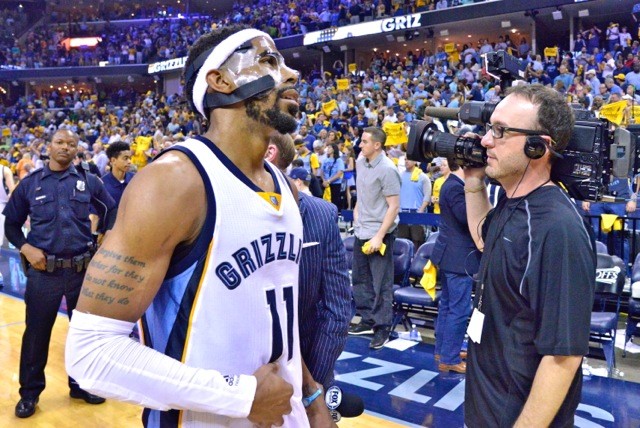 Larry Kuzniewski
Larry Kuzniewski
“Dead is the mandible, alive the song.”
Vladimir Nabokov, Pale Fire
Author’s Note: This is a weird one. It probably won’t make much sense unless you first go read Grit and Grind: Burned in a Pale Fire, a great piece my friend Matt Hrdlicka wrote, and to which this piece is mostly a set of responses and annotations.
Let’s start with the first sentence.
Before the season, I wrote that Grit ‘n Grind was a tired term in need of retirement.
We’ve all said it, and yet it’s still with us. I think Chris Herrington’s recent distinction is a good one to think about here: there are two things we mean when we say “Grit and Grind”; the first describes an era of Grizzlies basketball, and the second describes an overarching ethos, a way in which Memphis as a community expects our basketball team to reflect us, or at least the outlaw part of ourselves that we keep mostly under wraps.
While the latter is just as “Memphis” as Isaac Hayes’ Eldorado, the former is no longer an adequate framework for discussing what’s going on with the team. It is bankrupt. It has been thoroughly strip-mined of new ways to discuss what happens on the court, as you’d expect from any other metaphor about a core team that’s been together since 2009. It’s come to mean more than it should, and to imply an embrace of ugliness, when what it really was, say, when the Grizzlies beat the Clippers in a Game 6 and we poured all of our collective bloodlust—Memphis is a city that loves to see just how close we can come to being totally out of control—it was only ever an exhortation to do what you do, how you do it. To play hard, and fight anybody who tries to swing on you first. It was never about pace or offensive rating. It was a cri de cœur.
[jump]
Hrdlicka writes:
But what I’m tired of, more than the lens of Grit ‘n Grind, is the lens itself. Any lens. Any narrative.
Yes. More on this later. And there’s a great discussion of Pale Fire, which is really a book wrapped around a book wrapped around a couple of unreliable narrators wrapped around a critical volume of a long poem, one that means everything, contains everything, and maybe ultimately prevents itself from meaning anything.
Modern fandom is about narrative, or more exactly, narratives at war. A meticulously crafted “this game was about X” piece inevitably begets a snide “well actually.”
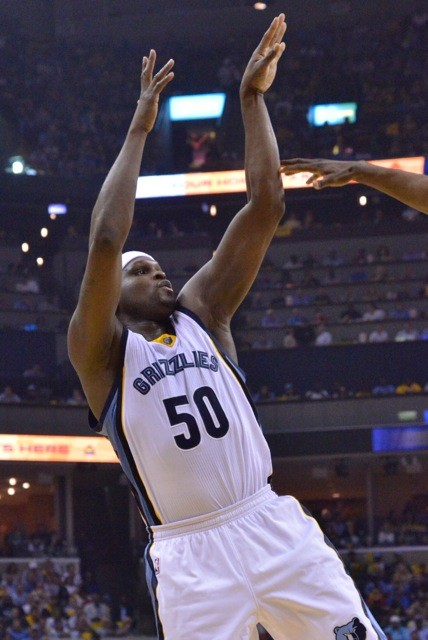 Larry Kuzniewski
Larry Kuzniewski
There is a reason for this—a reason that Hrdlicka almost brushes up against but never quite arrives at: there is a Sports-Content-Industrial Complex at work. Every moment of every season is analyzed, is compressed, is expanded. There are probably ten different people who wrote recaps of last night’s Grizzlies game who did not get paid to stay up past midnight and watch the thing, and who are not going to get paid any of the display ad revenue that the sites running their unpaid work will make. These companies make money because they drive enough traffic to generate massive numbers of pageviews, which is why they conglomerate into huge networks like SB Nation and Fansided: they create more web traffic if they can corral every fan of every team into the conversation.
These writers, some of whom are very good, and better than most if not all of the people actually getting paid to do this stuff, certainly including me, are all doing free work hoping they can build enough of a reputation that eventually someone will pay them for it. How do you do that? You come up with a well-considered take on what’s happening that is wholly your own. How do you do that? By responding to each and every minute detail of a season with a 750-word thinkpiece about What It All Means. What happens if some other site beats you to your take? Write 750 more words about why they’re right or wrong. Tweet the link to that. Post it to Facebook. Use the right Harry Potter GIF. Make sure you tweet during games so that you establish your Personal Brand. All of it while merely hoping that someday you might make it. Some do—I did, mostly through dumb luck and being devastatingly handsome—but most won’t.
Everything is a referendum on everything else because all of these people need something to write about. The Grizzlies are back on track. The Grizzlies are done forever. Chandler Parsons will be fine, stop being so mean. Chandler Parsons is an idiot bro whose legs will never work again. The front office is catastrophically stupid. The front office is staffed with unsung geniuses. Every take is available, has been written about, and has been argued against by someone’s Personal Brand. All of it. There is no end to the takes because without the takes there is no traffic and without the traffic Google can’t show you ads for the three items you just deleted from your Amazon cart.
Both “the game was about X” piece and the “well actually” might be worlds apart and both true.
I would argue that both of them usually are true, and that mostly we’re just arguing for the sake of argument, because “I’m gonna sit this one out” isn’t an option anymore.
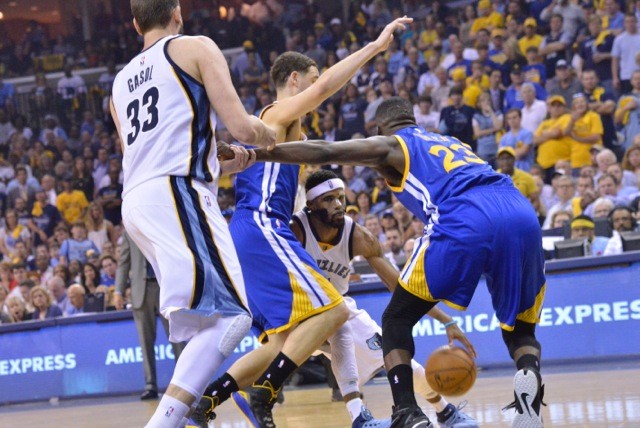 Larry Kuzniewski
Larry Kuzniewski
Back away from the publishing industry’s ad/surveillance vortex for a minute with me and come back to the court:
We’ve all become unmoored because the identity of the team has been GnG for years but GnG doesn’t win every night. It’s tired; I’m tired; and part of the reason we’re tired is because nothing makes sense.
Here’s a thing I just talked about in my roundup of the Grizzlies’ miserable 0-4 road trip: GnG hasn’t ever actually won every night. The effort level required to win 60 games playing that style of basketball (unable to score outside of ten feet and flailing like madmen on defense to hold the other team under 100 just to have a chance at a win) is why they haven’t ever done it. They always fall off, or play down to bad teams, or get so behind against teams that can shoot that they just give up and wait for the end of the game so they can fly home. They physically can’t do it 60 times a year, much less 82. And when they don’t have it, they usually know it right at the beginning of the game—remember, this is a squad that has been together for the better part of a decade—and they just flat out quit. Sometimes they don’t, and they come back in daring fashion, but what determines when they do and when they fold like a broken lawn chair?
[pullquote-3]
I have no idea. Neither do you, but you have to write 700 words on a deadline and so do I. The complex has its hooks in us, even as we watch.
We need to give up the lens and just watch basketball.
Yes, but what does that mean? How do we do it? We, who talk about this stuff, write about it, think about it, argue about it on the internet… how do we just watch the game, without carrying a storyline into it? Isn’t everything a story, and isn’t that what this is: just another story about stories? I’ll return to this thread.
There’s an extended riff on Moonlight, which I have not seen, because I barely participate in current culture for a lot of reasons, most of which are time constraints (another of which is Burton’s Anatomy of Melancholy, but sure). And a revealing observance about the Oscar snafu that everyone is talking about instead of talking about Moonlight:
Mockery of {insert literally anything here} is the parlance of our time because it allows us to place the {insert the mocked thing again here} beneath us.
I’m going to put that in another block quote, and in bold, because you need to read it again.
Mockery of {insert literally anything here} is the parlance of our time because it allows us to place the {insert the mocked thing again here} beneath us.
This sentence is the entire basis of our online world in 2017, but it feels more true on Twitter than anywhere else. Every possible opinion is expressed, and then immediately shouted down by a hundred Literal Actual Nazis and other assorted Kobe Bryant fans who haven’t even read the original article or even heard of the author. By pointing out that someone else is stupid, we frame the conversation in terms of our own obvious superiority. You hate-retweet the stupid take (which is almost always stupid) because you’re virtue signaling, not because you’ve read the article. (Don’t read the article, though.) Look how smart I am, and look at this fool! Look, I’m not a fool! Look!
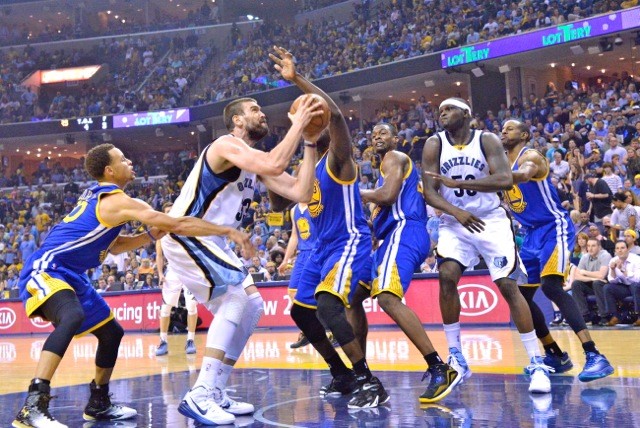 Larry Kuzniewski
Larry Kuzniewski
How do we give up the lens? Can it be done?
I recently read a book by Mark Fisher called Capitalist Realism: Is There No Alternative?. Highly recommended reading in general, but all of this talk of Grizzlies Narrative Exhaustion and the Sports Content Industrial Complex has me thinking of this particular passage, right there on page 2 (emphasis mine):
…we are inevitably reminded of the phrase attributed to Fredric Jameson and Slavoj Žižek, that it is easier to imagine the end of the world than it is to imagine the end of capitalism. That slogan captures precisely what I mean by ‘capitalist realism’: the widespread sense that not only is capitalism the only viable political and economic system, but also that it is now impossible even to imagine a coherent alternative to it.
We, those of us who live in this stuff, can no longer think of another way to approach it. We have to generate a narrative around this stuff because in the explosion of sports writing in the last 10-15 years, we can no longer imagine a world in which there doesn’t need to be an aggrieved thinkpiece every time the team slumps. As we enter an era in which everything is fed through the Facebook News Feed, totally driven by clicks and engagement, the only way we know how to even talk about sports anymore is in this call-and-response of Hot Take and Counter Hot Take, peppered with the offense I commit most often and most egregiously, “You Are Dumb For Having A Hot Take.”
There is no end to Grit and Grind as a narrative because we don’t know how else to talk about this team anymore, and even going forward into the next five or ten years, the only way the Grizzlies will be talked about is through this framework. There is no other possibility; they’ve all been sealed off.
[pullquote-2]
Think about it this way: the team just started its own media arm, seven years into the Grit and Grind era, and called it Grind City media. It’s literally the brand of the entire city of Memphis now. An entire generation of young Memphians has now grown up who associate the word “grind” with the Grizzlies and with this city. When does a generation change its mind about where they’re from? How long does that take?
Not to mention that the impossibility of escaping The Narrative means none of this is even fun anymore. You guys ever read the Communist Manifesto? Here:
[Capital] has drowned the most heavenly ecstasies of religious fervor, of chivalrous enthusiasm, of philistine sentimentalism, in the icy water of egotistical calculation.
Replace “Capital” with “Smart sports takes” and don’t you start to see what I mean? How it’s impossible to just be a fan anymore, once you’ve stepped onto the Sports Content treadmill, and once it starts nagging at you that yelling for the guys in the blue shirts to beat the other guys—what might easily be described as “chivalrous enthusiasm” and/or “philistine sentimentalism”—becomes impossible because you’re worried about the standings, about Zach Randolph’s usage rate, or because you know Lance Stephenson threw a woman down the stairs, of because you’re thinking about the new defensive scheme, or you just read 1,000 words about now Rudy Gay is like Lindsay Buckingham, which is a real thing I actually wrote in 2013 when I was trying to prove how smart I was?
Where do we go from here? What follows Grit and Grind, from this vantage point, is and can only be Grit and Grind. There’s no “there” to which we’re headed.
A brief sidebar:
But a game or a text, possessions and sentences stacked on top of each other, defy reduction.
Except… sometimes they don’t. Sometimes the answer is “they got good looks but they shot 35% and the other team shot 45% on the same shots.” Even when that’s patently the case, there’s a narrative to tend to.
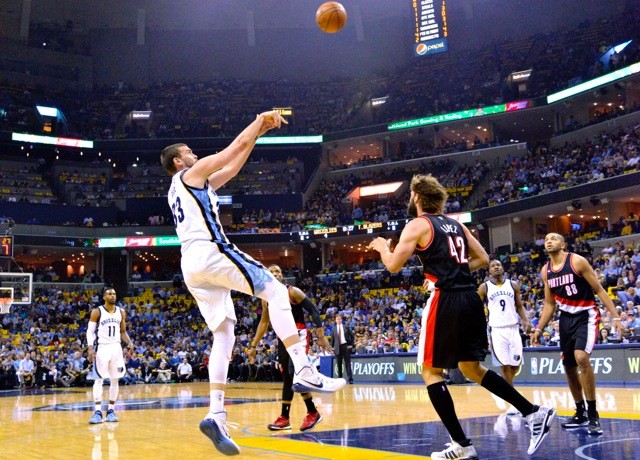 Larry Kuzniewski
Larry Kuzniewski
I’m going to wind this up, I think. Let’s look at Hrdlicka’s last section and pick at it a little, because it’s so good it begs to be quoted, and it gets at something I’ve been thinking about since September.
Can we not enjoy this team in their twilight? Joe Mullinax wrote about the Dying of the Light– can’t we let them rage while understanding they will stumble in the act? …The team’s identity has shifted but the players are still in the room. They simply don’t have it every night.
There’s an arms race to write the best, and earliest, eulogy for the Grit and Grind era. In hindsight, I probably wrote my own entry without even realizing it. But we’re all in this for glory, and to turn a good phrase, and who doesn’t want to be the orator at the end of it all, giving the Shakespearean monologue that ties a beautiful bow on the still-warm corpse of a fallen civic hero?
But that’s a fool’s errand these days, anyway. Everything we feed into the Sports Content Vortex is lost in a week, and in a month, you can only ever find it with Google anyway. It’s Dory from Finding Nemo, only able to respond to thoughts and ideas from the last two weeks, because there’s just so much of it that it scrubs its past as it pushes forward. When the narrative is all you’ve ever known, the “stumbling in the act” becomes a deviation from Grit and Grind, not a natural product of the age of the guys out there. Key to the whole sports media complex right now is a sort of denial that bodies get old and break down and then can’t play anymore, and that really, retired NBA players are so young they (hopefully) have the bulk of their adult lives left to live. The Chandler Parsons injury this year, speaking of bodies breaking down, puts 31 and 35 year old men right back in the same roles they filled when they were 26, 27, and 31, and anyone old enough to know can tell you that’s just not going to work for long.
Which means: as an era of basketball, Grit and Grind is probably already dead even as it perpetuates itself into the future forever. It already died. We missed our chance at The Great Grizzlies Thinkpiece because we couldn’t see past the season in front of us because we were too busy writing recaps for you to read at your desk at work the next morning.
[pullquote-1]
Hrdlicka and I were going to write a book about the 2015-16 season, and I’m glad we didn’t because of the injury slog, but in hindsight, even that would’ve been too late to really capture it. The wave crests and then recedes, and in that moment when it hangs there, you don’t realize it, but underneath it’s already pulling back, already stripping back the sand below, down with the shells.
…what comes next may not be as good. Then again, maybe that’s our fate as fans. Maybe letting go is too hard, the present too close to the future for comfort.
This is what happens when it becomes impossible to reason outside of the narratives: there is no present. What we think is the present is the top of the wave, hanging there for that split second. The “future” we’re all afraid of is next year’s salary cap, and underneath, the scouring has already started. And when it happens, we only have the tools we’re given to talk about it, and the little bits of abalone that scatter where our castles used to be.